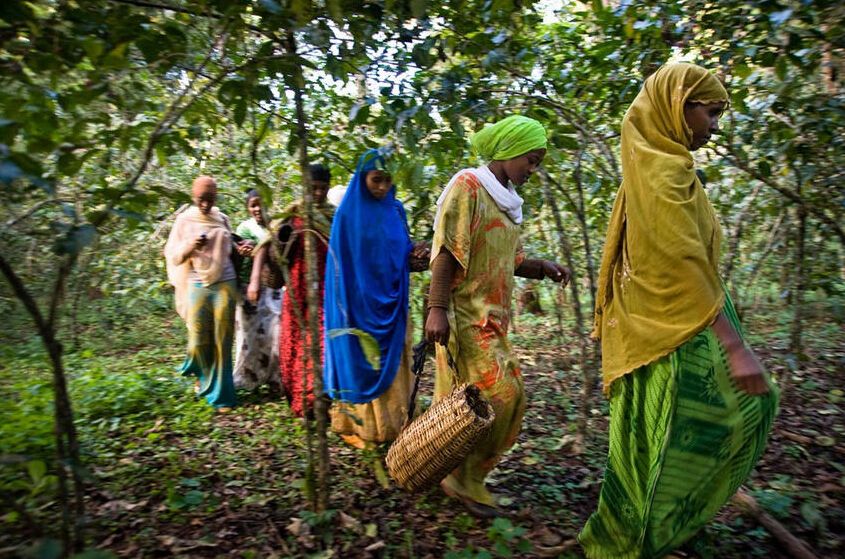African Coffee: A Slow Journey to China

Coffee originated in Africa and little is known about it. In fact, Africa Ethiopia is the hometown of coffee, producing the best Arabian coffee in the world. Soil, climatic conditions and an altitude of more than 2000 meters above sea level have enabled many African countries to create an ideal environment for the growth of coffee.
At present, coffee production in Africa accounts for about 13% of the world's total output, and coffee income is an important source of GDP and exports for some African countries. Ethiopia's coffee exports are the largest source of the country's foreign exchange earnings, accounting for more than 35 per cent of the country's total foreign exchange earnings, about 25 per cent of the national livelihood is directly or indirectly related to coffee, 40.5 per cent of GDP and about 20 per cent of taxes come directly from the coffee industry.
According to Anduram, an Ethiopian, coffee cultivation is the main income of Ethiopians, and its output ranks second in Africa. Eighty-five percent of households in Ethiopia grow coffee, and other cash crops include flowers, sesame seeds, beans and so on. Ethiopians grow coffee in almost every household and drink coffee every day, and coffee shops can be found everywhere on the streets. As for the price of coffee, of course, it is also very low. Each kilogram of coffee in Ethiopia costs only 80 bill (16 bill to the dollar), or $5, or more than 30 yuan, which is only enough to buy a cup of coffee at Starbucks in China.
Excellent quality and low price are not only a prominent symbol of African coffee, but also won a high international reputation, attracting many well-known European and American buyers to purchase in Africa, including Starbucks in the United States and St. Spurs in the United Kingdom.
Chinese people have been drinking tea for thousands of years. As the origin of tea in the world, people more or less ignore or despise coffee as a foreign beverage in terms of consumption habits and concepts. The coffee culture of Chinese mainland should have started from the Anglo-French-Japanese concession in old Shanghai, while the cafes at that time were infested by foreigners and upper-class Chinese, and did not enter the lives of ordinary people. In recent years, with the impact of foreign culture and the change of life style, more and more coffee has entered the homes of ordinary Chinese people, and Chinese coffee culture has gradually flourished.
For China's coffee market, many analysts believe that the market is huge and has great potential for development. Compared with the global average growth rate of 2%, China's coffee consumption is growing at an astonishing rate of 15% a year, according to the International Coffee Organization in London. The average Chinese drink only three cups of coffee a year, compared with 500 to 700 cups for Americans.
With the rise of Chinese coffee culture, people gradually began to understand African coffee, and even many coffee lovers began to promote and sell African coffee in China after tasting African coffee. However, sales of African coffee in the Chinese market are still very small, and most people mention that African coffee is still confused.
Mr. Albert, the chief representative of the China Representative Office of the Rwanda Development Agency, said bluntly that the country's coffee exports to China accounted for a small proportion of its total exports when talking about Rwanda's coffee exports to China. "the annual export of coffee from Rwanda is about 30,000 tons, while less than 1,000 tons of coffee is exported to China, accounting for a very small proportion." Mr. Albert said, "the latest data we have is from 2008 to 2009, and the export value of Rwandan coffee to China is about more than 100000 US dollars, about 50-100 tons. In 2010, China imported a small amount of coffee, mainly well-packaged ripe beans. There are both raw and cooked beans imported in 2011. "
In the face of China, a huge emerging market, African coffee has been in a lukewarm, slow development stage, for many reasons. First of all, compared with the traditional Chinese tea culture, the rise of Chinese coffee culture is short and its influence is weak.
Whether a city's coffee culture is strong or not can be seen intuitively from its coffee sales. Just take Beijing and Shanghai, the two major cities of China, as an example. Shanghai had related coffee promotion in the 1930s, and coffee had already entered the Shanghai market at that time. The cultivation of coffee culture in Shanghai has experienced a history of more than half a century. The coffee culture in Beijing rises late and takes a short time to cultivate. When it comes to drinks in Beijing, people may still remember the big bowl of tea in old Beijing. The different coffee cultures of the two cities bring about completely different market sales. According to the head of a company that sells Ugandan coffee in Beijing, the sales of Ugandan coffee sold in Shanghai is much larger than that in Beijing, and can even double.
African countries lag behind in the field of coffee processing and packaging, and the lack of influential private brands is another reason for their slow development in China. Due to the backward development of most African countries in the field of coffee processing and packaging, the largest exports of African countries are still raw coffee beans. After purchasing raw coffee beans from Africa, international coffee processing enterprises process, package and brand them in their respective countries. When consumers finally come into contact with the finished coffee, it has changed into "Italian coffee", "American coffee", most people do not know the origin of coffee.
Exporting in the form of raw beans is not entirely a helpless choice for the African coffee industry. In many cases, African countries are more willing to export in the form of raw beans. Mr. Albert said: "there are two main considerations on the question of imported coffee, ripe beans or raw beans." On the one hand, it is the question of freight. Unless China imports a large amount of ripe beans from Rwanda, for example, reaching a container. If the import volume is very small, it needs to be transported by air, which is too expensive. The other is the consideration of tariffs. China has set preferential tariffs on some African goods, in which raw coffee beans do not have to pay import duty when they are imported into China, but only need to pay VAT, while imports of cooked beans are subject to import duty and VAT. " Attracted by the tax policy, many enterprises are willing to export in the form of raw beans. After entering China, they are packing and selling. "the coffee processing industry in Rwanda is a promising industry. At present, the coffee industry in Rwanda only has simple processing such as baking and packaging. As for deep processing such as instant coffee, it has not been realized, nor can it meet international standards. " Added M. Albert.
The African coffee industry does not pay enough attention to the Chinese market, or the Chinese consumer market is not enough to attract the interest of the African coffee industry. "in terms of sales, coffee produced in Rwanda is basically in short supply, and our supply and demand contracts with foreign buyers are usually five years, so there is no sales pressure. After the European debt crisis emerged in 2010, orders from Europe and the United States decreased, and we began to pay attention to the Chinese market. " Monsieur Albert introduced.
In addition, the unfavorable promotion of African coffee industry in China and the lack of brand awareness are all the reasons for the slow trip of African coffee to China. With the closer economic and trade relations between China and Africa in recent years, Chinese people have a deeper and deeper understanding of Africa. More and more Chinese people taste and fall in love with African coffee. Many of them consciously act as ambassadors for African coffee publicity and are active in the Chinese-African coffee market.
Important Notice :
前街咖啡 FrontStreet Coffee has moved to new addredd:
FrontStreet Coffee Address: 315,Donghua East Road,GuangZhou
Tel:020 38364473
- Prev

Yunnan Coffee from the outside: coffee Plantation in Yunnan
People living in modern cities are no stranger to the word coffee, and its inherent form is so deeply rooted in the hearts of the people: black slightly bitter liquid is filled in porcelain cups, and coffee fans drink its acid and taste its bitterness. even the mood has become an indispensable culture of coffee. Undeniably, I like coffee very much, too. By chance, I met a coffee grower.
- Next

Coffee in Vietnam is also famous in the world.
I didn't know until I arrived in Vietnam that Brazil is the kingdom of coffee, but Vietnam's coffee is also famous in the world. The Vietnamese love coffee, just as the Chinese love tea, it is a kind of love and fascination that goes deep into the bone marrow and brings from the blood, perhaps it is that cup of coffee that gradually bakes out the gentle and easygoing patience of the Vietnamese people. Pure Vietnamese coffee is drip coffee, there is a special drip coffee pot, coffee
Related
- Detailed explanation of Jadeite planting Land in Panamanian Jadeite Manor introduction to the grading system of Jadeite competitive bidding, Red bid, Green bid and Rose Summer
- Story of Coffee planting in Brenka region of Costa Rica Stonehenge Manor anaerobic heavy honey treatment of flavor mouth
- What's on the barrel of Blue Mountain Coffee beans?
- Can American coffee also pull flowers? How to use hot American style to pull out a good-looking pattern?
- Can you make a cold extract with coffee beans? What is the right proportion for cold-extracted coffee formula?
- Indonesian PWN Gold Mandrine Coffee Origin Features Flavor How to Chong? Mandolin coffee is American.
- A brief introduction to the flavor characteristics of Brazilian yellow bourbon coffee beans
- What is the effect of different water quality on the flavor of cold-extracted coffee? What kind of water is best for brewing coffee?
- Why do you think of Rose Summer whenever you mention Panamanian coffee?
- Introduction to the characteristics of authentic blue mountain coffee bean producing areas? What is the CIB Coffee Authority in Jamaica?

